Best AI test automation tools in 2024
The author of this article is tech expert Pieter Murphy. Invited expert — Software Testing Team Leader, one of the creators of EngX AI-Supported Testing course Oleksandr Antonov.

Testing has always been a cornerstone of successful software development, ensuring seamless performance and reliability across platforms. Yet, as systems grow increasingly complex, traditional methods often fall short of meeting modern demands. Enter artificial intelligence (AI) — a game-changer transforming how teams approach automation, reducing errors, and accelerating the process.
Choosing the right tools can make or break a project, especially when efficiency and precision are at stake. From startups to tech giants, everyone is on the lookout for the top AI test automation tools that can integrate seamlessly into their workflows. Here’s a look at some of the best.
What is the role of AI testing tools in test automation?
The integration of artificial intelligence in testing has redefined the boundaries of what test automation can achieve. Traditional testing often relied on rigid scripts that required constant updates, but AI introduced adaptability and intelligence into the process.
By analyzing vast amounts of data, identifying patterns, and learning from previous outcomes, AI can predict potential issues before they arise. This proactive approach not only improves the accuracy of testing but also reduces the time spent on repetitive tasks, freeing up teams to focus on more strategic challenges.
Using AI to augment software testing goes beyond basic efficiency — it transforms the way testing is applied across various applications. From identifying edge cases to optimizing resource usage, AI tools for automation testing are driven by machine learning (ML) algorithms that evolve with each test cycle. This means testers can rely on dynamic frameworks that adapt to changes in the codebase, making them invaluable in agile environments. Whether it’s regression testing, performance analysis, or usability assessments, AI-driven tools empower organizations to deliver software that meets high standards of quality and reliability.
What are the benefits of AI automation testing tools?
The transition from manual to automation testing has been a pivotal step in modernizing the testing landscape, and AI testing tools have elevated this shift to new heights. Unlike manual testing, which is labor-intensive and prone to human error, AI-driven tools optimize every aspect of the testing process.
These tools analyze vast amounts of data, adapt to changes in the code, and automatically generate test cases, reducing the workload for teams. This level of efficiency ensures faster feedback loops, enabling organizations to address issues in real-time and maintain their project timelines without compromising quality.
Implementing AI-powered automation tools also significantly enhances the scalability and accuracy of software testing. As applications grow more complex, traditional methods struggle to keep up with the demand for thorough and continuous testing. AI bridges this gap by dynamically adapting to new inputs and identifying issues that might go unnoticed by conventional scripts. This not only ensures a higher standard of reliability but also reduces costs associated with rework or late-stage bug fixes.
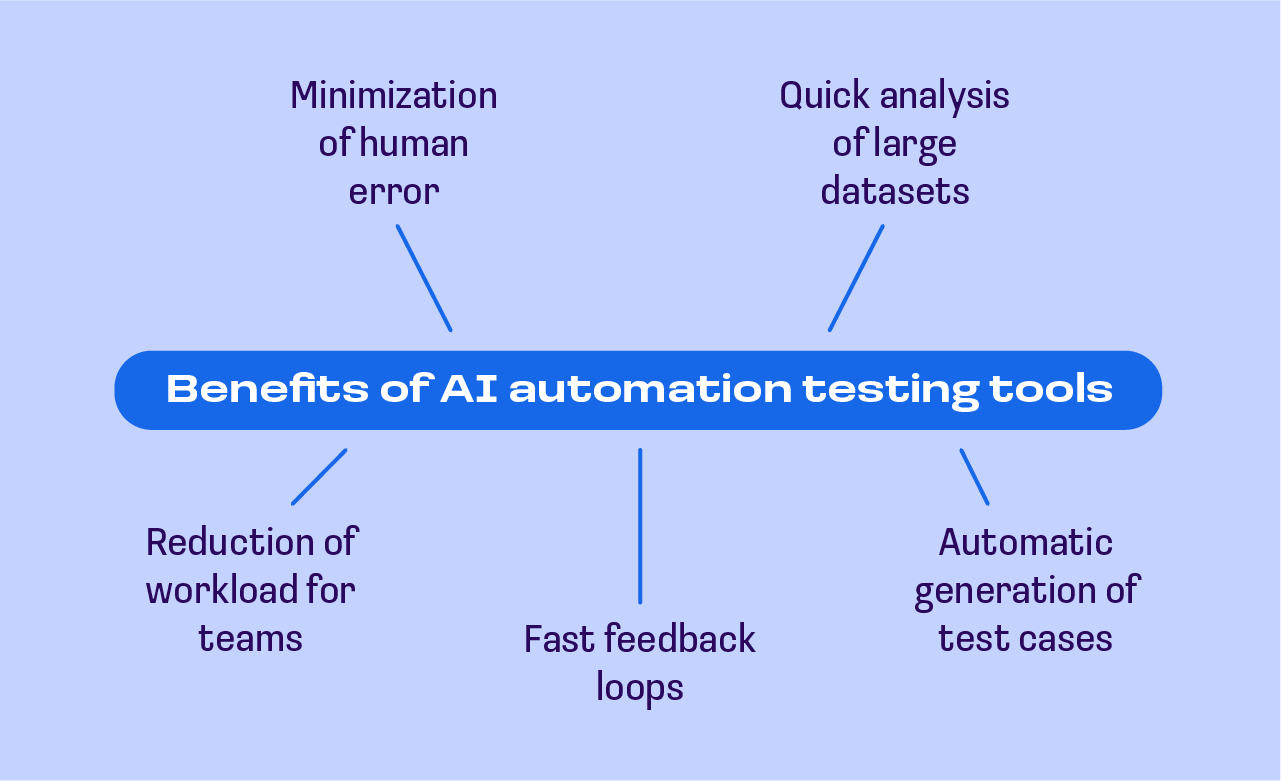
Top AI testing tools in 2024
1. Testim
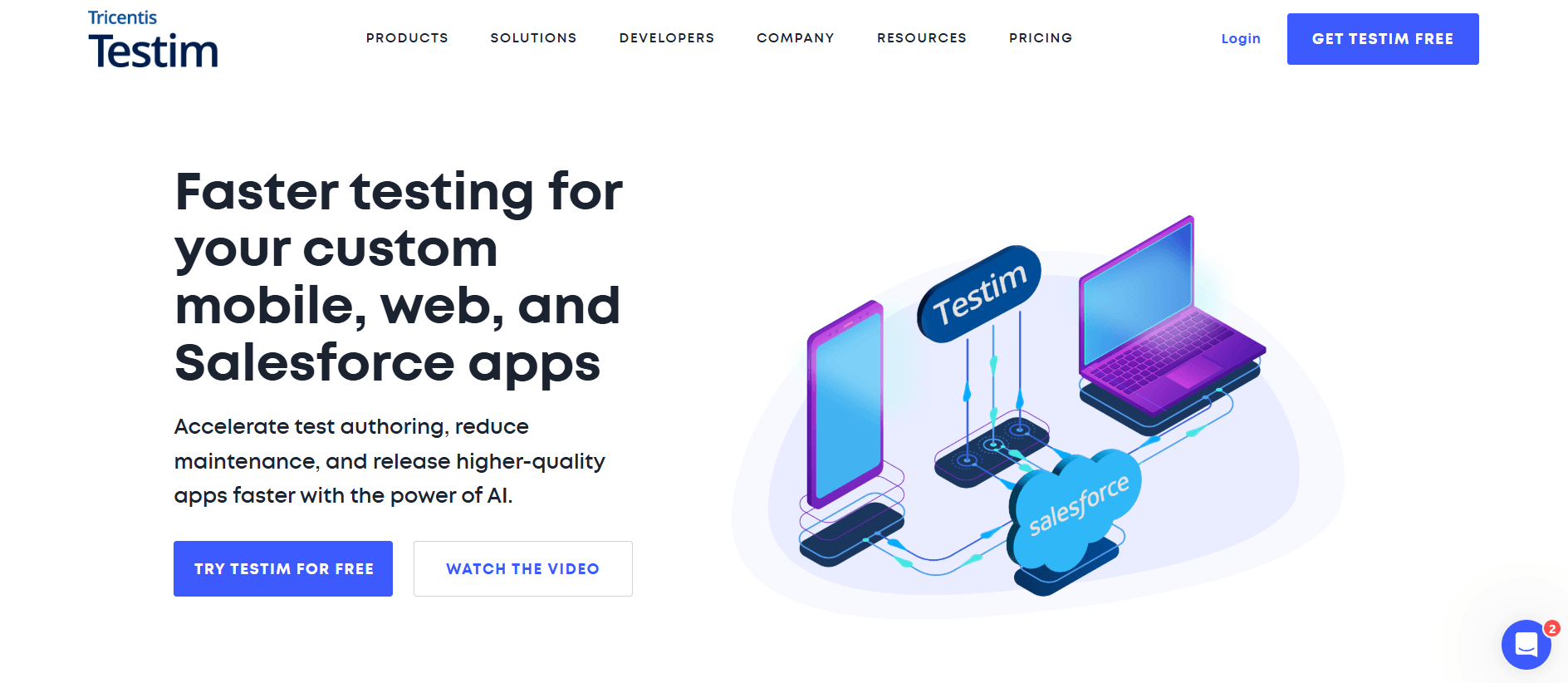
Description
Testim is a powerful AI-driven tool designed to streamline and enhance the software testing process. Known for its ease of use, Testim leverages machine learning to create and execute reliable tests that adapt to changes in the application’s UI. This adaptability eliminates the need for constant script maintenance, making it ideal for agile development environments.
Testim also offers robust debugging capabilities, helping teams identify and resolve issues quickly. Whether you're scaling a small project or managing enterprise-level software, Testim ensures precision and efficiency in testing.
Main features
- AI-driven algorithms for creating, maintaining, and executing automated tests.
- Integration support for CI/CD tools like Jenkins, GitHub, and GitLab.
- Detailed test logs and analytics for tracking execution and identifying issues.
Advantages
- AI-driven test creation and maintenance with adaptive learning to reduce script upkeep.
- Robust debugging and reporting tools to quickly identify and resolve issues.
- Seamless integration with CI/CD pipelines for scalable and efficient workflows.
Drawbacks
- Initial setup and customization can require significant effort for complex projects.
- Limited support for non-standard or highly customized applications.
- Dependency on AI algorithms may lead to unpredictable behavior in specific test scenarios.
2. Katalon
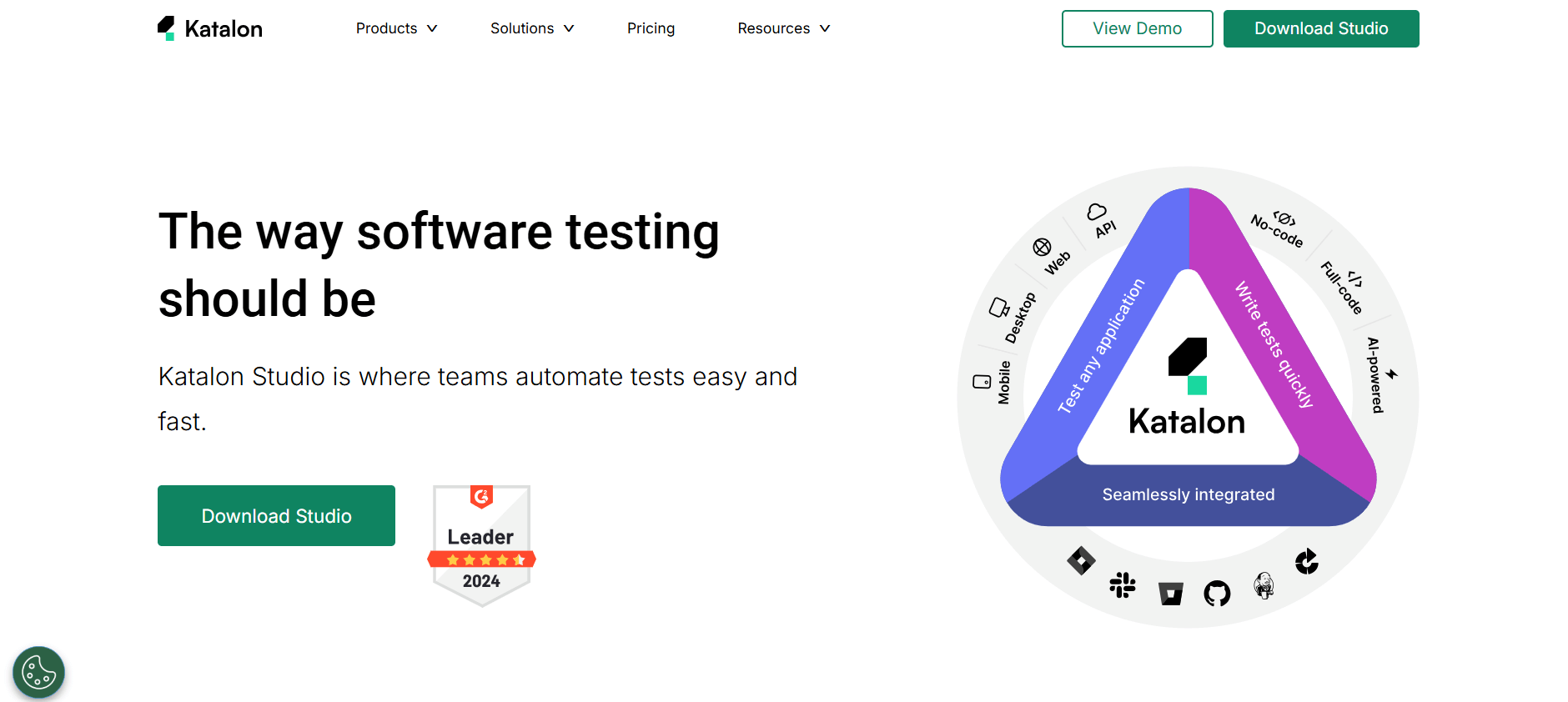
Description
Katalon is a comprehensive platform that offers a complete suite of testing tools for web, API, and mobile applications. Designed to support teams of all expertise levels, Katalon provides an intuitive interface along with advanced scripting capabilities for seasoned testers.
Its AI-assisted features simplify how to transition from manual to automated testing, making it an excellent choice for organizations seeking a smooth shift to automation. With Katalon, users can take advantage of pre-built templates, detailed reporting, and seamless integrations with popular CI/CD pipelines, ensuring a faster and more reliable development lifecycle.
Main features
- Supports scripting in multiple languages, including Groovy and Java.
- Built-in test frameworks for web, API, desktop, and mobile platforms.
- Data-driven testing with parameterized inputs for extensive test coverage.
Advantages
- Comprehensive platform supporting web, API, and mobile testing with minimal setup.
- Pre-built templates and advanced scripting options for testers of all expertise levels.
- Integration with popular CI/CD tools, ensuring a seamless development lifecycle.
Drawbacks
- The free version has limited features compared to the enterprise edition.
- Requires some scripting knowledge for advanced test cases, which may not suit all users.
- Performance can degrade when handling large-scale, complex testing environments.
3. Eggplant
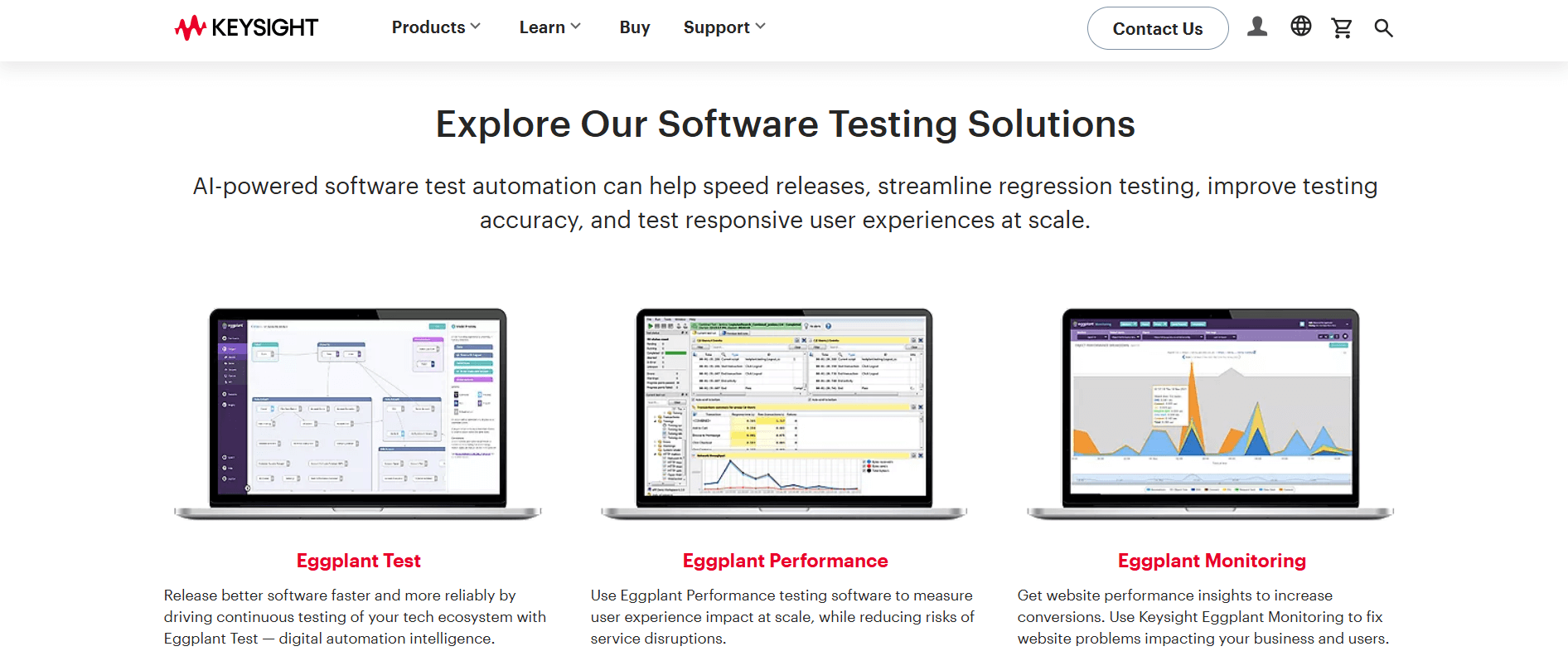
Description
Eggplant stands out among AI automation testing tools for its ability to approach testing from an end-user perspective. Unlike traditional methods that focus solely on the code, Eggplant’s model-based testing evaluates software performance and functionality based on user interactions. Its AI-powered algorithms analyze system behavior, ensuring that the application delivers a seamless experience.
For teams interested in implementing automation without extensive programming expertise, Eggplant’s intuitive design makes it accessible even for those developing their skills to start working QA. With Eggplant, organizations can reduce testing time and improve product quality across various platforms and environments.
Main features
- Model-based testing technology that connects directly to applications.
- Image recognition and OCR capabilities for interface testing.
- API integration for performance and functional test monitoring.
Advantages
- Model-based testing to evaluate applications from an end-user perspective.
- AI-powered analysis for detecting performance bottlenecks and usability issues.
- Cross-platform testing capabilities for diverse environments, including mobile and desktop.
Drawbacks
- Higher cost compared to many competitors, making it less accessible for smaller teams.
- Steeper learning curve for teams unfamiliar with model-based testing approaches.
- Limited community support compared to other widely used tools.
4. Applitools

Description
Applitools revolutionizes visual testing by utilizing AI in testing tools to ensure pixel-perfect user interfaces across devices. Its proprietary Visual AI technology identifies UI anomalies while eliminating false positives, reducing the need for excessive manual oversight. Applitools integrates with any program or code repository, supporting agile teams with a robust roadmap for QA automation testing.
Designed for compatibility with major CI/CD pipelines, Applitools enables quick deployment and validation of changes. This powerful tool delivers unmatched precision in testing design and functionality, making it an essential asset for companies prioritizing user experience.
Main features
- Visual AI for automated UI comparisons and baseline management.
- Cross-browser and cross-device compatibility validation tools.
- RESTful API support for seamless integration with CI/CD pipelines.
Advantages
- Visual AI technology to ensure pixel-perfect user interfaces across devices.
- Comprehensive cross-browser and cross-device compatibility testing.
- Seamless integration into CI/CD pipelines with detailed analytics and reporting.
Drawbacks
- Focuses heavily on visual testing, which might not meet broader testing needs.
- Requires additional tools or integration for comprehensive functional testing.
- Cost can be a barrier for small businesses or teams with limited budgets.
5. Accelq
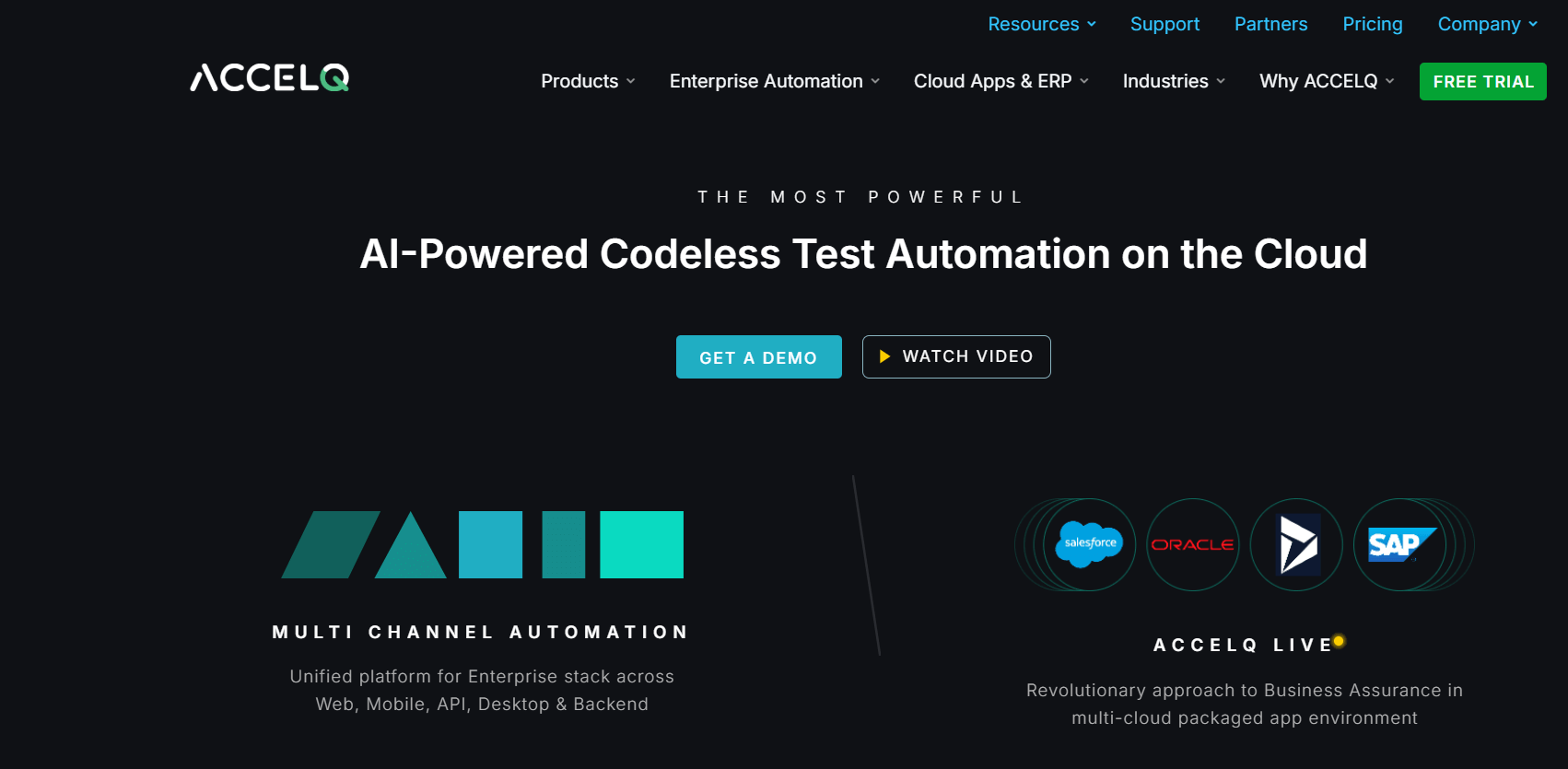
Description
Accelq is a robust AI-powered automation platform that simplifies end-to-end testing for web, API, and mobile applications. Known for its no-code approach, Accelq allows teams to automate tests without extensive programming knowledge, making it accessible to a wide range of users. Its intuitive interface and intelligent capabilities accelerate test creation, execution, and maintenance while seamlessly integrating into CI/CD pipelines.
Recognized as one of the most popular tools for mobile testing, Accelq ensures comprehensive coverage and precision across various devices and platforms. Whether used for testing a complex enterprise app or a lightweight project, its adaptability and advanced analytics make it a standout choice among AI tools for quality assurance, helping teams deliver flawless applications efficiently.
Main features
- Cloud-native test automation platform with modular test asset management.
- Comprehensive support for API, web, and mobile application testing.
- No-code testing interface with reusable test components.
Advantages
- No-code platform enabling rapid test creation and execution with AI-driven adaptability.
- Recognized as a leader in mobile testing with comprehensive device and platform support.
- Cloud-based infrastructure ensuring scalability and collaborative workflows.
Drawbacks
- Limited offline capabilities due to its cloud-based nature.
- Higher learning curve for those unfamiliar with its unique interface and workflows.
- Advanced features require enterprise licensing, which can be expensive.
6. Functionize
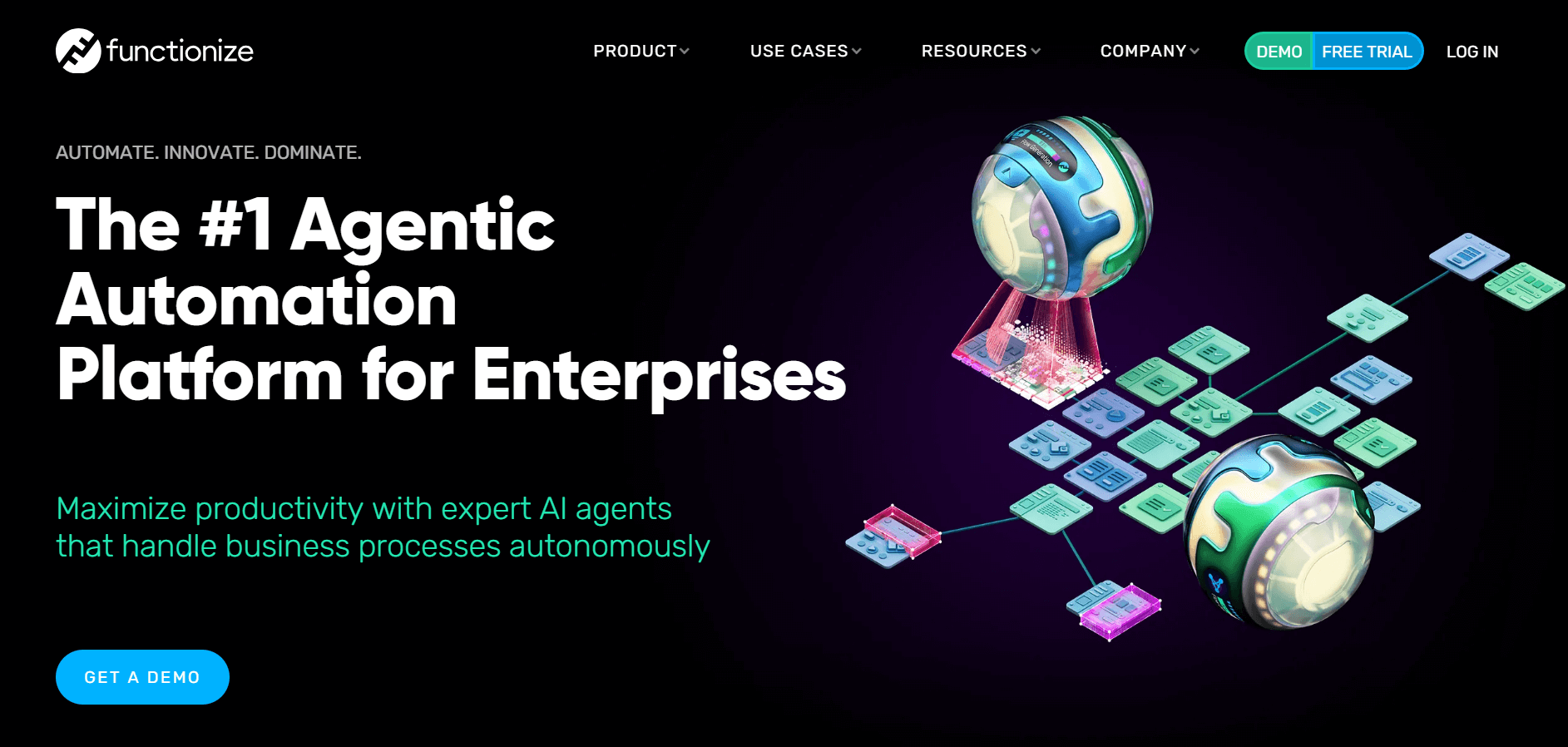
Description
Functionize is an innovative platform that leverages AI tools for testing to simplify and enhance test automation processes. With its cloud-based architecture, Functionize supports web and mobile testing while delivering fast and accurate results. The platform’s machine learning algorithms enable tests to adapt automatically to changes in applications, reducing maintenance efforts and ensuring seamless execution.
Teams can create powerful tests without writing extensive code, making it an ideal solution for organizations aiming to scale their automation testing career path. Functionize’s predictive analysis and advanced debugging features help teams identify and address issues effectively, ensuring high-quality software delivery.
Main features
- Self-healing test scripts that dynamically adapt to UI changes.
- AI-powered test execution engine for cross-browser and API testing.
- Parallel test execution on cloud infrastructure for large-scale applications.
Advantages
- Self-healing tests that adapt automatically to changes in application code.
- Cloud-based testing for web, mobile, and API applications with actionable analytics.
- Intuitive interface designed to simplify the test automation journey for all users.
Drawbacks
- Limited integrations with niche development or testing tools.
- Costs can escalate as testing requirements scale.
- May not perform as well for highly customized or legacy systems.
7. TestCraft
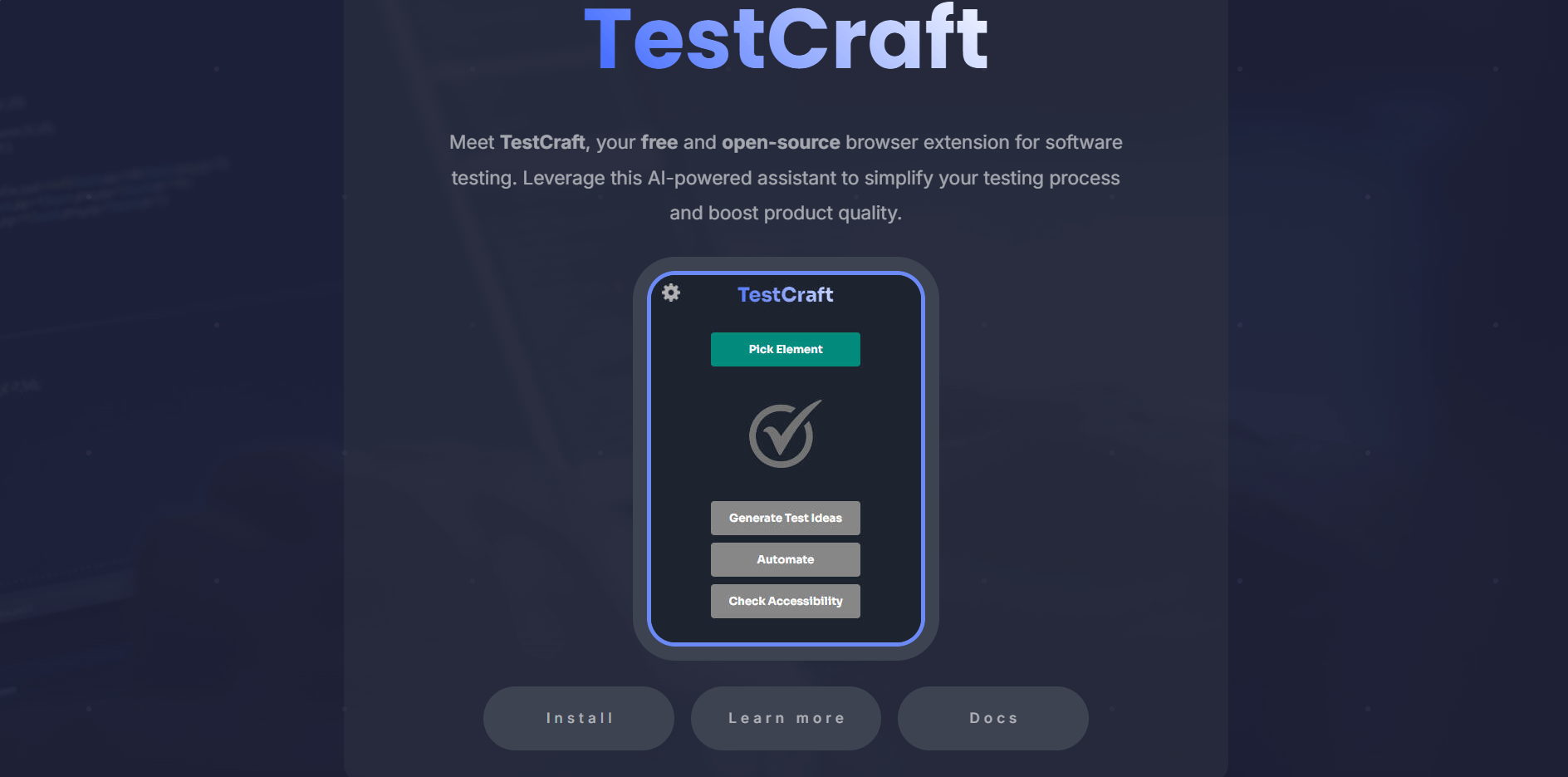
Description
TestCraft is a versatile test automation platform designed to simplify the QA process with its no-code, drag-and-drop interface. By leveraging AI based QA tools, TestCraft eliminates the need for constant script maintenance, allowing tests to adapt dynamically to changes in the application. This adaptability, powered by advanced algorithms, ensures more accurate and efficient testing.
TestCraft's real-time support for continuous integration and delivery pipelines makes it an ideal solution for agile teams. It also helps testers identify and resolve bugs quickly, improving overall product quality. Whether you’re exploring how to become an automation tester or looking for an easy way to scale testing efforts, TestCraft provides a user-friendly and highly effective solution for modern QA challenges.
Main features
- Visual test builder with drag-and-drop functionality for creating workflows.
- Continuous updates to test scripts in response to application changes.
- CI/CD tool compatibility for integrated testing processes.
Advantages
- No-code, drag-and-drop interface for easy test automation without programming knowledge.
- AI-based tools that dynamically adapt to application changes to reduce script maintenance.
- Real-time support for CI/CD pipelines to enhance agile testing processes.
Drawbacks
- Relies heavily on internet connectivity due to its cloud-based infrastructure.
- Limited support for highly customized test scenarios or frameworks.
- Advanced analytics and reporting features are less robust than competitors.
8. Mabl
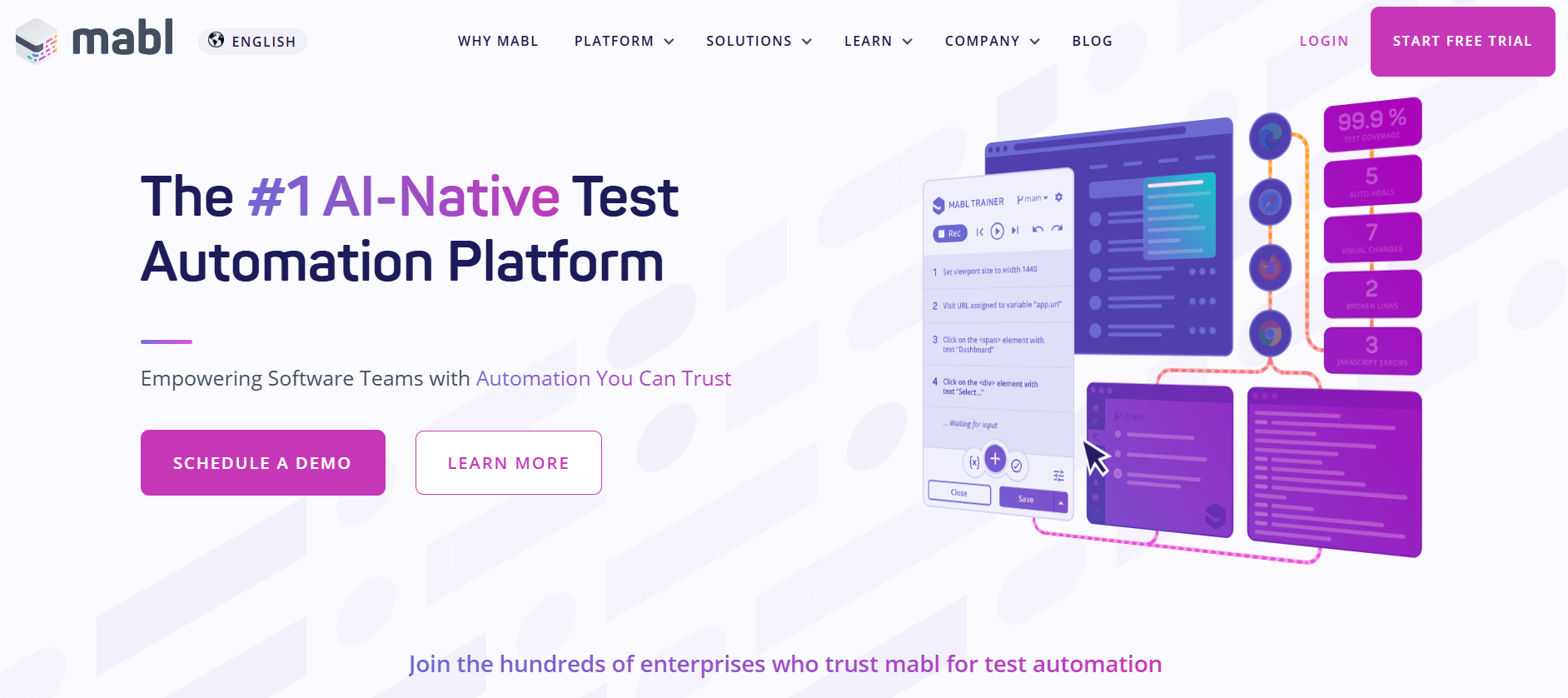
Description
Mabl is a leading test automation platform that seamlessly integrates generative AI in testing to optimize software quality assurance. With its self-healing capabilities, Mabl reduces errors and minimizes test maintenance by automatically adapting to changes in the application. Designed for both beginners and seasoned professionals, it’s an excellent tool for those exploring how to become a QA automation engineer.
Mabl's cloud-based infrastructure supports end-to-end testing, including web, API, and mobile applications, while offering actionable insights through detailed analytics. Its intelligent AI QA tools enhance the speed and efficiency of test creation and execution. Mabl empowers teams to maintain high-quality software delivery cycles, making it an indispensable resource for modern, agile development environments.
Main features
- Unified platform for web, API, and mobile testing with AI-driven test automation.
- Automated identification and adaptation to application UI changes.
- In-depth reporting with detailed insights for executed test cases.
Advantages
- Self-healing automation with machine learning to reduce errors and maintenance time.
- Comprehensive test coverage for web, API, and mobile applications with detailed insights.
- Seamless integration with CI/CD pipelines to accelerate the development lifecycle.
Drawbacks
- Focuses primarily on web testing, with limited mobile testing capabilities.
- Dependency on CI/CD integrations may hinder standalone testing efforts.
- Cost may be prohibitive for startups or small teams.
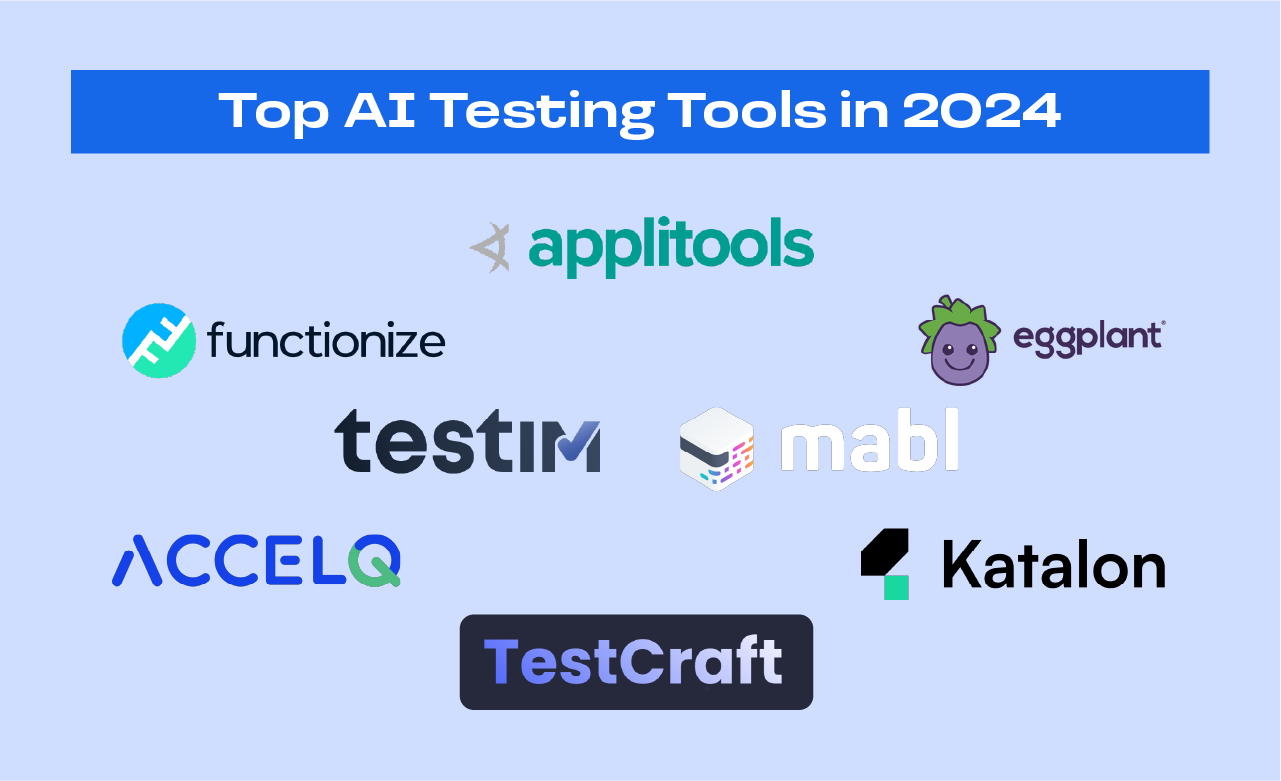
Questions for expert:
Which of the above AI tools for software testing will be covered in the course?
“Examples from AI-Supported Testing course can be used EPAM Dial, ChatGPT chats, GitHub Copilot and ELITEA,” says Oleksandr Antonov.
Learn to effectively use AI software testing tools in the course from EngX
Engineering Excellence (EngX), introduced by EPAM in 2014, revolutionized the way software engineers approach development by offering cutting-edge tools and methodologies to enhance performance. The program fosters a culture of innovation by integrating AI tools for QA and creating specialized resources for continuous growth across various types of tech domains. While you can learn a lot from the best book for automation testing, EngX demonstrates how a dynamic program works to elevate engineering standards, from website optimization to full-scale software development.
The EngX AI-supported testing course offers a transformative learning experience, equipping professionals with the skills to harness the power of large language models for advanced testing workflows. Participants gain expertise in foundational concepts, making it easier to travel the life journey of a QA automation engineer.
From requirement analysis to test cycle closure, the course demonstrates how to integrate tools like ChatGPT for automated testing effectively. Providing a comprehensive test automation engineer overview, the course delivers these valuable insights all at a reasonable cost.


.png)
